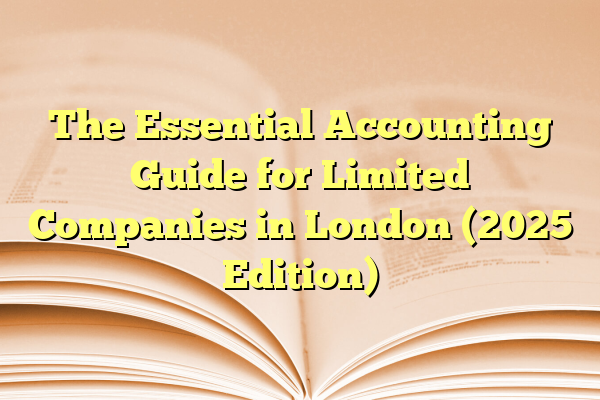
The Essential Accounting Guide for Limited Companies in London (2025 Edition)
Running a limited company in London comes with a host of responsibilities, particularly when it comes to financial management. Staying compliant with HMRC and Companies House regulations is essential, and accounting sits at the heart of it all. This guide offers a concise but comprehensive overview of essential accounting practices for limited companies in London in 2025.
Contents
Understanding Your Legal Obligations
In the UK, limited companies are separate legal entities, meaning their finances must be entirely distinct from those of their directors. This requires maintaining accurate financial records and fulfilling several legal requirements including:
- Filing annual accounts with Companies House
- Submitting a Corporation Tax return (CT600) to HMRC
- Keeping up with PAYE and VAT submissions (if applicable)
- Maintaining accurate records of income, expenses, assets, and liabilities
Failing to meet these obligations can result in penalties or legal consequences, so a solid accounting strategy is vital from day one.
Choosing the Right Accounting Method
Limited companies in the UK generally use the accruals basis of accounting, recognising income and expenses when they are earned or incurred, not when the money changes hands. This method gives a more accurate picture of your company’s financial health, especially important for investors or lenders.
That said, some micro-entities can opt for simpler financial reporting under FRS 105. Consulting an accountant is the best way to determine which accounting standards you should follow.

Cloud Accounting Solutions in 2025
As of 2025, most limited companies in London are turning to cloud-based accounting software like Xero, QuickBooks, or FreeAgent. These tools automate many accounting tasks and offer features like:
- Real-time bookkeeping and bank reconciliation
- Automated invoicing and reminders
- Digital receipt and expense capture
- Integration with HMRC for Making Tax Digital (MTD)
This is particularly important as Making Tax Digital (MTD) requirements continue to expand. From April 2026, even more businesses will be mandated to report their taxes digitally. It’s smart to stay ahead of the curve now to ensure compliance later.
Payroll and Dividends
For directors and employees, payroll must be handled accurately. Using tools like HMRC’s Basic PAYE Tools or outsourced payroll services helps ensure salaries, National Insurance, and taxes are calculated properly. Also frequent is the use of dividends to pay directors. These should only be issued if your company has sufficient post-tax profits, and they must be supported by board minutes and dividend vouchers.

VAT and Corporation Tax in 2025
For businesses above the VAT threshold of £90,000 (as of 2025), VAT registration is mandatory. You’ll have to submit VAT returns quarterly and follow MTD rules. Corporation Tax remains at 25% for profits over £250,000, with a marginal rate for profits between £50,000 and £250,000.
Your company must register for Corporation Tax within 3 months of starting trade and pay any tax owed within nine months and one day of the end of the accounting period. Filing deadlines should always be monitored to avoid steep penalties.
Year-End Compliance
By your company’s financial year-end, you’ll need to:
- Prepare statutory accounts
- Submit accounts to Companies House within 9 months
- File your Company Tax Return to HMRC
- Pay any Corporation Tax due
Meeting these deadlines can be complex, which is why many companies outsource or appoint an accountant to oversee year-end filings.
Frequently Asked Questions
- Q: What are the current Corporation Tax rates?
A: For 2025, the standard rate is 25% for profits over £250,000. A tapered rate applies between £50,000 and £250,000. - Q: Can one director run a limited company?
A: Yes, a limited company in London can be operated by a single director and shareholder. - Q: Do I need an accountant to run a limited company?
A: While it’s not legally required, working with a qualified accountant is highly recommended to ensure compliance and avoid costly mistakes. - Q: What records should a limited company keep?
A: Companies must maintain records of income, expenses, VAT (if registered), payroll, and any shareholder or board-related documents for at least 6 years. - Q: What is Making Tax Digital (MTD)?
A: MTD is a HMRC initiative to digitise tax reporting. Limited companies above certain thresholds must use MTD-compliant software for VAT and soon Corporation Tax submissions.
In conclusion, proper accounting isn’t just about staying compliant—it’s about making informed decisions and growing your business responsibly in a competitive city like London. With the right tools, expert help, and a clear understanding of your duties, your limited company can thrive financially in 2025 and beyond.
